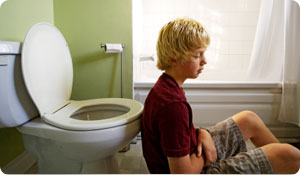
If your child is suffering from the discomfort of an upset stomach, making him feel better as quickly as possible is your priority. An upset stomach, or indigestion, often occurs when your child eats something that doesn't agree with him. Eating too much, or too fast, can also cause upset stomach symptoms. If your child complains of stomach pains, burning in the chest or throat, diarrhea or nausea, these can be signs that his or her stomach is off kilter or upset. In addition, if your child has a cold or cough, sometimes the mucus can drip into the stomach and can cause tummy trouble.
What You Should Know
You may think of indigestion as an ailment that affects only adults, but actually a child's upset stomach can cause the same kind of suffering, and how you relieve it can be similar to how you would treat your own symptoms─with one exception. While you may use an acid-reducing medicine for yourself, with your child you should try making diet changes instead, since antacids should not be used for kids unless recommended by your doctor. Further, if your pediatrician does suggest an over-the-counter medicine, read labels carefully and confirm that anything you use is appropriate for your child's age and weight.
How to Ease the Pain
If your child suffers from an occasional upset stomach, the symptoms will usually go away quickly without leaving any lasting effects. In the meantime, there are some easy dietary changes you can help get the digestive system back to function at its best.
For instance:
- Be sure your child avoids greasy and fried foods, which can be difficult to digest.
- Skip the chocolate and citrusy fruits, as these can irritating, too.
- Avoid milk products, which can be hard on the stomach.
- Opt for bland foods like crackers, toast, mashed potatoes, rice or a bland soup, since these are all easy to digest.
- Eat small amounts rather than big meals. This means your child's stomach won't have to work as hard.
- Rest after eating to allow time to digest before getting too active.
Avoid Dehydration
If your child's upset stomach is also accompanied by diarrhea, this is usually not a cause for concern. If the symptom is mild, you probably don't have to do anything, and it should resolve on its own. But if it becomes more severe, continues for more than a few days, or is accompanied by vomiting, your pediatrician will likely recommend that your child ingest an electrolyte drink or suck on electrolyte popsicles to replenish the water and salt supply. This is important to head off dehydration, which occurs when your child loses too much fluid either from diarrhea and/or vomiting too. Here are some warning signs that your child could be dehydrated:
Mild Signs of Dehydration:
- Extreme fussiness
- Crying without tears
- Dry mouth and lips
- Fewer wet diapers in infants, or going 6 hours or more without urinating for children
- Sunken spot on a baby's head
If the symptoms are allowed to progress and become more severe, your child can also experience:
- Wrinkled skin
- Looking "out of it" or unfocused
- Extreme tiredness
- Weakness
- Rapid breathing
- Weak but fast pulse
- Lack of urination continuing for a longer period.
If you notice any of these signs, you should seek medical attention for your child right away, since dehydration can be extremely dangerous.
A Final Word
If the upset stomach symptoms seem to occur frequently, you should talk to your pediatrician to see if your child could have a food intolerance or allergy or possibly even experiencing acid reflux.
Sources:
American Academy of Pediatrics (AAP)
http://www.aap.org/publiced/BR_Diarrhea.htm
KidsHealth.org/Nemours Foundation
http://kidshealth.org/teen/diseases_conditions/digestive/indigestion.html
University of Iowa Hospitals and Clinics
http://www.uihealthcare.com/topics/medications/medi4741.html





